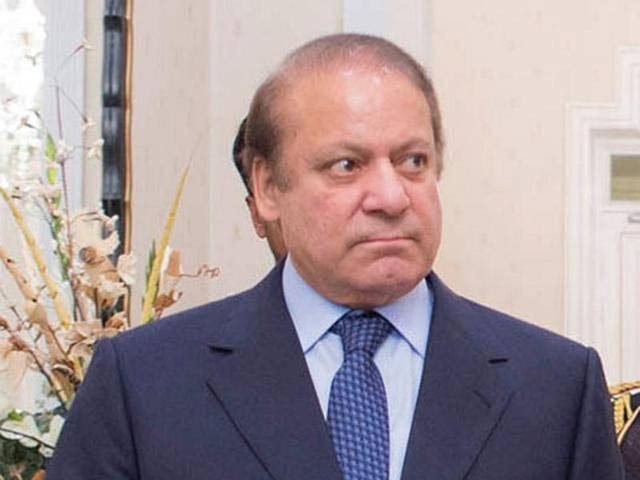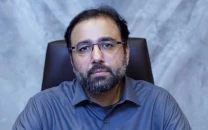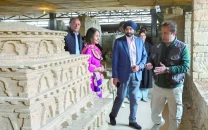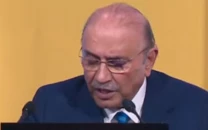PM doesn’t have absolute immunity: SC
Bench says only the president, and governors under Article 248 of Constitution have complete immunity

PM doesn’t have complete immunity like president, governors, says bench. PHOTO: REUTERS
The observation came after Premier Nawaz Sharif’s attorney failed to impress a five-judge larger bench with his argument on the privilege of parliamentarians under Article 66 of the Constitution.
SC cannot directly disqualify PM in Panamagate case: counsel
Makhdoom Ali Khan, while resuming his arguments on the 10th hearing of the Panamagate case on Tuesday, tried to convince the bench, headed by Justice Asif Saeed Khosa, that there was absolute privilege of free speech in parliament.
“The prime minister does not claim immunity from any proceedings under Article 248 of the Constitution; however, he is claiming the privilege of free speech like any other parliamentarian under Article 66 of the Constitution,” Khan said.
Sharif’s counsel stated that the issue of privilege had been brought in because the disqualification of his client has been sought on the basis of a speech in parliament.
Imran Khan’s Pakistan Tehreek-e-Insaf, one of the petitioners in the Panamagate case, has requested the top court to disqualify the prime minister for making a ‘false statement’ in parliament about the ownership of the Sharif family’s property in London.
Sharif’s counsel contended that his client was an MNA; therefore, “don’t judge him less than any MNA”.
He believes the court should be very careful while interpreting Article 66 of the Constitution because it will have far-reaching implications as it will define the right to speech of every member of the federal and provincial legislatures.
“A narrow reading of Article 66 will result in all political feuds in the legislature ending up as legal disputes to be adjudicated by this court,” Khan said.
When he cited several judgments of foreign courts about the privilege of free speech of parliamentarians, Justice Khosa observed that “nobody is prosecuting the prime minister on the basis of his speech in parliament”. However, he said the issue was whether the Supreme Court could look into his speech or not in the context of the case.
Disqualification of PM to set a dangerous precedent: SC
“These were not regular parliamentary proceedings as the prime minister himself had volunteered to say something on the Panama Papers issue,” Justice Khosa said while referring to Sharif’s speech.
Another member of the bench, Justice Sheikh Azmat Saeed, said the immunity and privilege to the prime minister was not absolute, it was subject to the Constitution. “The president and the governor under Article 248 of Constitution have complete immunity, but not the prime minister,” he added.
Justice Khosa observed that committing a crime was not performance of official duty and parliament was not an “island where you can do whatever you want”.
Regarding the allegation of tax evasion against his client, Khan said the PTI chairman has made four allegations to seek disqualification of Sharif under Article 63(1)(0) for tax evasion. The allegations are that $9million received from sale of Gulf Steel in the 1980s should have been declared as wealth in the tax returns submitted under the Wealth Tax Act 1963. Secondly, the wealth statement for tax year 2011 and tax year 2012 had been filed later which was an offence attracting a penalty. Thirdly, gifts worth Rs317,000,00 to Hussain Nawaz and Rs194,594,40 to Maryam Nawaz were sham and gifts received by Sharif from his son should have been treated as income and tax paid on it.
The counsel said the prayers in the PTI’s petition were contradictory as the petitioner was seeking disqualification while also requesting a direction to the Federal Board Revenue for a further probe. “If prayer 6 is denied, prayer 1 cannot be granted and if prayer 6 is granted, prayer 1 cannot be granted.”
Khan stated that his client should be assessed under and in accordance with the same law as the rest of citizens of Pakistan. “He [Sharif] doesn’t claim a better treatment but he should be treated no worse,” he said. Upon this, the bench observed that this matter could not be reopened.
Maryam’s reply
Premier Sharif’s daughter Maryam Nawaz submitted her reply in the Supreme Court wherein she said that she was not dependent on her father since her marriage in 1992.
Not dependent on PM since 1992, Maryam tells SC
Maryam’s attorney Shahid Hamid presented details of assets and taxes paid by his client in agriculture and non-agriculture income.
Maryam stated that the Raiwind estate comprising five homes belonged to her paternal grandmother.
According to the reply, the aggregate income of Maryam and her husband had been further supplemented by the salary and allowances that her spouse has drawn since 2008 as a member of the National Assembly.
Her husband has been a taxpayer since he joined the government service in 1986.
“The self-evident and mala fide purpose of the false and frivolous allegation that she [Maryam] is a dependent of her father is to try and disqualify him for not declaring her assets in his nomination form.”
Published in The Express Tribune, January 18th, 2017.



















COMMENTS
Comments are moderated and generally will be posted if they are on-topic and not abusive.
For more information, please see our Comments FAQ